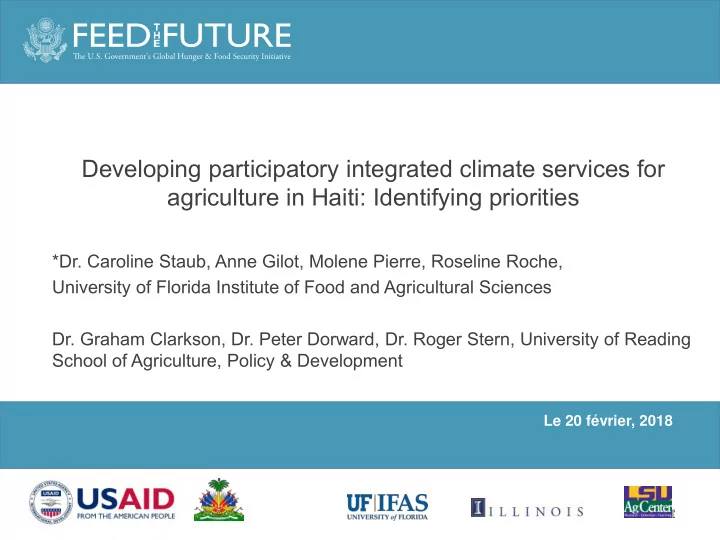

Developing participatory integrated climate services for agriculture in Haiti: Identifying priorities *Dr. Caroline Staub, Anne Gilot, Molene Pierre, Roseline Roche, University of Florida Institute of Food and Agricultural Sciences Dr. Graham Clarkson, Dr. Peter Dorward, Dr. Roger Stern, University of Reading School of Agriculture, Policy & Development Le 20 février, 2018 � Photo Credit Goes Here
MANAGING CLIMATE RISK IN AGRICULTURE • Types of impacts: • Losses that follow a damaging extreme + unfavorable season • Opportunity cost during favorable years • Climate risk management • Systematic use of climate information • Use of strategies that reduce vulnerability • Risk transfer strategies
CLIMATE DATA AND SCIENCE ARE UNDER-USED BY POLICY MAKERS AND DECISION MAKERS • Climate data and science are increasing but utilization is not • Inequitable access to representative data • There is no quick technical fix • Inability to use the data • Relevance, credibility, legitimacy • Cost, risk and time associated with trying a new technology • Constraints that limit flexibility to respond to forecasts • Disconnect between producers and users of climate information • Mismatch between perceived and actual farmer needs • An adequate institutional process can help
VULNERABILITY TO CLIMATE RISK OF AGRICULTURAL ECONOMIES ON SMALL ISLAND DEVELOPING STATES (SIDS) https://www.cia.gov/library/publications/the-world-factbook/geos/ha.html
'APPUI À LA RECHERCHE ET AU DÉVELOPPEMENT AGRICOLE’ AREA AGRO-CLIMATE PROGRAM Increase data availability Improve access to weather data Reinforce local capacity to access and use data
CLIMATE EXTENSION PROGRAM GOALS 1. Create or reinforce connections in the ag. community 2. Train trusted intermediaries to discuss climate risk with farmers 3. Facilitate learning through the use of participatory tools 4. Leverage Haiti's existing institutional structure and approach to agricultural decision-making
CONNECTING WITH LOCAL EXPERTS ON CLIMATE RISK • Focus groups with key informants from key regions • Goals • Question our assumptions re. climate risk & management in Haiti • Analyze the institutional process • Identify the right intermediaries
RESULTS (1/5) 1) CHARACTERISTICS OF AGRICULTURE IN EACH REGION • Small farmers are dominant, especially so in the mountains - have < 1 acre, no access to mechanization (add based on pics) • > 30% medium size farmer in the plains (who are they based on pics) • Highlands mostly rainfed, parts of the lowlands have access to irrigation • Higher diversity in both crop and animal production at higher elevations • Temperature is better suited to a wider range of crops • More flexibility to adapt to climate variability • Drought > disease > pests > torrential rain
IMPACTS AND MANAGEMENT OF CLIMATE VARIABILITY • Difficult to reach consensus on unusually wet and dry years • Both dry and wet extremes are becoming more frequent, rains are delayed that historically dry seasons have become wet • Impacts and strategies vary geographically • Harder to adapt in the lowlands, drier and warmer: farmers are selling, changing livelihood or migrating to the DR • Lowlands are more suited to crop diversification
AVAILABILITY, ACCESS AND USE OF CLIMATE INFORMATION AND CLIMATE EXTENSION • Farmers do not have access to climate data • Small farmers have very limited access to weather data • Inequality of access to data related to awareness, access and legitimacy • Available: Basic short term forecast (temp & rainfall, windspeed and direction), cyclone warnings • Most trusted sources for weather info: State > Missionary projects > CRDDs • Most trusted communication channel: State (in person, town hall) > Radio > SMS
AVAILABILITY, ACCESS AND USE OF CLIMATE INFORMATION AND CLIMATE EXTENSION • Farmers have limited ability to use weather info to manage risk • No dedicated extension program focusing on weather and climate risk management • Farmers and agronomists are the most trusted sources of information regardless of affiliation • Educational background: Technical training or Bachelors in agronomy
FEEDBACK ON CLIMATE EXTENSION PROGRAM • Systematic use of climate information would require change in the farmer’s mindset and habits • Information presented to farmers would need to be tailored to their needs • Ideal trainers will have mandate, incentive and capacity to do the job • Sate employees are mandated to work with farmers and have a lower turn over compared to NGOs • NGO’s have the resources to be change agent but are subject to rapid staff turn over • Farmer organization meetings # 1 institutional structure for integrating climate risk management
REFLEXIVE STATEMENT • A contextual, multi-disciplinary, social process - trust-building is key • Strategic and purposeful interaction between farmers and producers of climate info • Climate is # 1 risk but no access to climate information for planning • Utility of weather forecast to farmers is minimal - Quantitative data required • Risks: structural (data), substantial (sustainability), relationships (past conflicts) • Opportunities: Buy-in from partners, expertise in agronomy, existing institutional structure
MERCI Dr. Caroline Staub International Agricultural Programs University of Florida Institute of Food and Agricultural Sciences 2250 Shealy Drive Gainesville, Fl. 32601 Email: carogstaub@ufl.edu Twitter: staub_caroline
www.feedthefuture.gov
MERCI Caroline Staub University of Florida IFAS International Agricultural Programs 2250 Shealy Drive Gainesville, Fl. 32601 Email: carogstaub@ufl.edu Twitter: staub_caroline
Recommend
More recommend